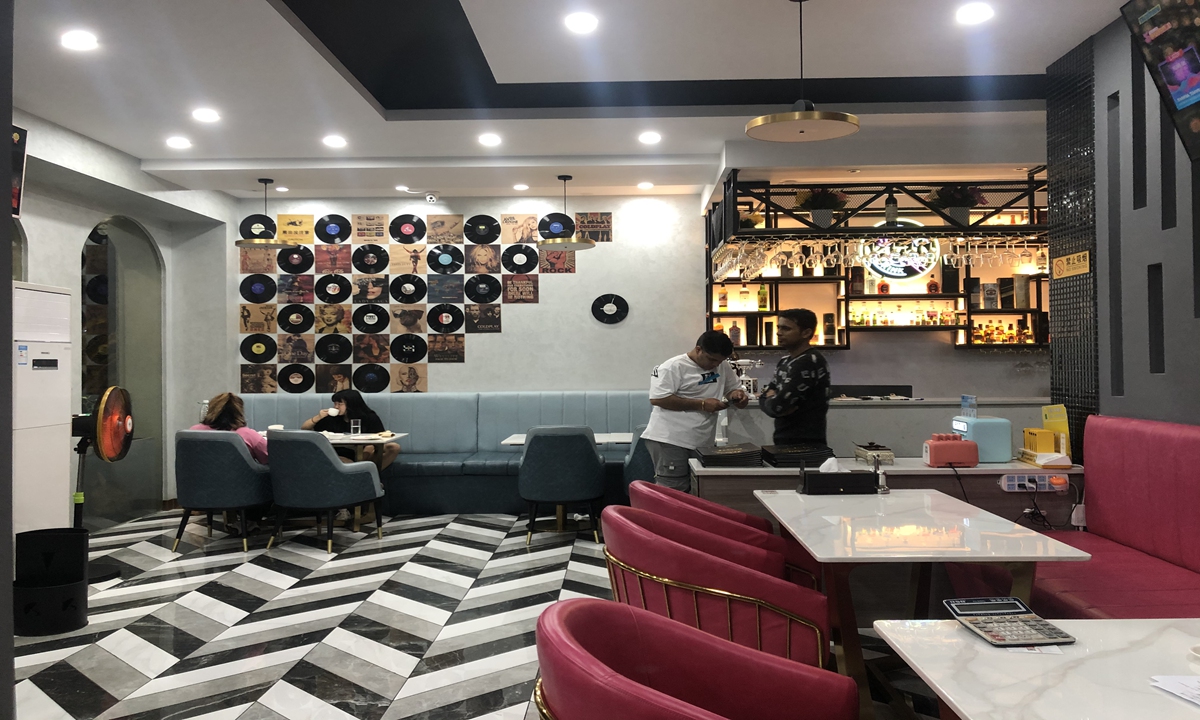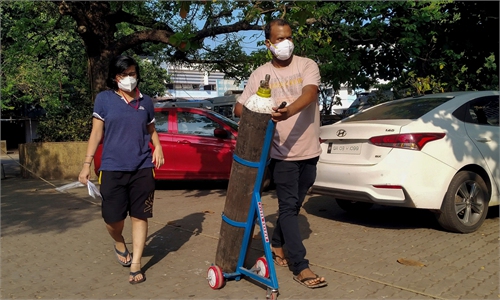
One of the restaurants run by Indian Amit Ramani along Chengbei Road in Yiwu, East China's Zhejiang Province Photo: Chen Shasha/GT
Chengbei Road, a street in Yiwu, East China's Zhejiang Province that used to be home to a dozen Indian restaurants, has lost its buzz as the restaurant runners and their patrons are stuck in India because of the COVID-19 resurge that has killed over 258,000 so far.
There are only two Indian restaurants open along the road dubbed "Indian street," the Global Times learned. Some closed as their runners or staff have failed to return, while some have closed because of poor business after travel between the two countries was suspended
"Before the pandemic, the restaurants here were packed. There were long queues in front of some shops and the buzz even continued to around 2 am. But now the street is empty, no more lights here after 8 or 9 pm," Arjun Khandelwal, an Indian businessman, told the Global Times on Wednesday evening, sitting in a restaurant that is still open.
The restaurant, run by Amit Ramani, was brightly lit and clean, but there were few customers. The whole street was dark and quiet, and a few cars passed by now and then.
"When Indian travelers came to Yiwu, they came here to have dinner. Our business used to be booming," Ramani told the Global Times. Now, most of his patrons are Chinese who mainly drop by at weekend.
Before the pandemic, there were 3,000 Indians living and doing business in Yiwu, but now there are only 500 to 600 due to travel restrictions, the Global Times learned from local Indians.
As early as 2012, India had overtaken Iran as the biggest recipient of Yiwu's exports.
Along with the slump in the catering business of Indians in Yiwu are plummeting product orders from India, which has put pressure on Indians engaged in foreign trade in the world's small commodity capital. To cut their losses and keep business running, some are trying to explore new opportunities from other countries.
Nirose P M, general manager of Yiwu China Office of Lulu Group International, told the Global Times that his company focuses on products like daily necessities, electronics, toys and access to India and Middle East countries. He said he is trying to make new product developments all over the world to shield it from the hit on their business to India, which used to account for 30 percent of their sales.
"To stay away from the virus, fewer people go to the supermarket, less demand for our products," he said.
The company is receiving more orders of medical and epidemic control products from India, including oxygen machines, oxygen cylinders, oxygen masks, oxygen regulators, oximeters, oxygen pipes, masks, gloves, and thermometers, Nirose said.
Oxygen machines are the most wanted products from India, and its price has doubled due to huge demand. "Previously, a 5L oxygen machine cost 1,800 yuan ($279.18) to 2,000 yuan. Now it is 3,200 to 3,600," Nirose said, adding that sales of these products to India only bring a small profit to support epidemic control in his home country. In the past months, his company has sent around 2,000 oxygen machines to India, and there are still pending orders.
Customer clearance in China is smoother compared to last year, but the problem is that some customers in India cannot accept more expensive oxygen machines, oximeters and other products, Aneesh Kolathappilly, marketing manager of the company.
What makes things worse is that sea freight prices of containers from China to India have also skyrocketed, another challenge that Indian businessmen are faced with. "It used to be $300 per container, but now it is $4,000 to $5,000," said Sunil Aidasani, founder of a trade company who has been doing business in Yiwu for 15 years.
His business has shrunk in half, as his customers in India, mainly supermarkets, worry that the epidemic would drag on and they cannot afford overstocking. He used to send over 20 to 30 containers to India per month before the epidemic, but that number has halved. Luckily, his businesses to other countries are returning to normal as vaccinations roll out worldwide.
The Yiwu government gave Ramani a subsidy of 20,000 yuan last year and 6,000 yuan this year to support his catering business, and his landlord also gave him a reduction in rent, according to Ramani.
Ramani is considering halting paying rent next year if the epidemic situation in India continues. But for him, it would be a hard decision to stop the business completely. He started his first restaurant on Chengbei Road in 2004. So far, he had his family run four restaurants here--two of them run by his father and brother have been temporarily closed as they are not able to come because of the viral resurgence in India.

